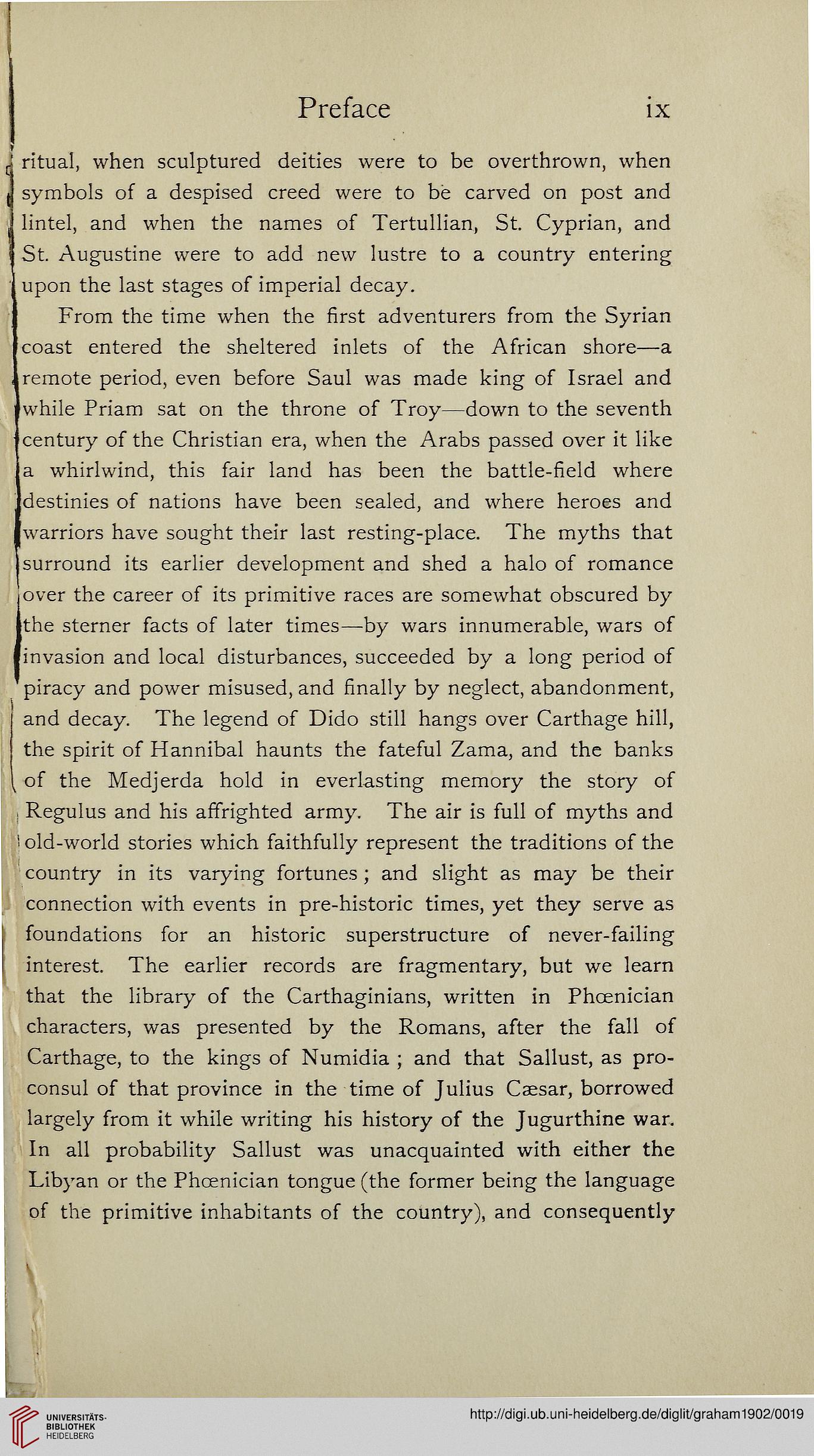ritual, when sculptured deities were to be overthrown, when
symbols of a despised creed were to be carved on post and
lintel, and when the names of Tertullian, St. Cyprian, and
St. Augustine were to add new lustre to a country entering
upon the last stages of imperial decay.
From the time when the first adventurers from the Syrian
coast entered the sheltered inlets of the African shore—a
remote period, even before Saul was made king of Israel and
while Priam sat on the throne of Troy—down to the seventh
century of the Christian era, when the Arabs passed over it like
a whirlwind, this fair land has been the battle-field where
destinies of nations have been sealed, and where heroes and
warriors have sought their last resting-place. The myths that
surround its earlier development and shed a halo of romance
over the career of its primitive races are somewhat obscured by
the sterner facts of later times—by wars innumerable, wars of
invasion and local disturbances, succeeded by a long period of
piracy and power misused, and finally by neglect, abandonment,
and decay. The legend of Dido still hangs over Carthage hill,
the spirit of Hannibal haunts the fateful Zama, and the banks
of the Medjerda hold in everlasting memory the story of
Regulus and his affrighted army. The air is full of myths and
j old-world stories which faithfully represent the traditions of the
country in its varying fortunes ; and slight as may be their
connection with events in pre-historic times, yet they serve as
foundations for an historic superstructure of never-failing
interest. The earlier records are fragmentary, but we learn
that the library of the Carthaginians, written in Phoenician
characters, was presented by the Romans, after the fall of
Carthage, to the kings of Numidia ; and that Sallust, as pro-
consul of that province in the time of Julius Caesar, borrowed
largely from it while writing his history of the Jugurthine war.
In all probability Sallust was unacquainted with either the
Libyan or the Phoenician tongue (the former being the language
of the primitive inhabitants of the country), and consequently
symbols of a despised creed were to be carved on post and
lintel, and when the names of Tertullian, St. Cyprian, and
St. Augustine were to add new lustre to a country entering
upon the last stages of imperial decay.
From the time when the first adventurers from the Syrian
coast entered the sheltered inlets of the African shore—a
remote period, even before Saul was made king of Israel and
while Priam sat on the throne of Troy—down to the seventh
century of the Christian era, when the Arabs passed over it like
a whirlwind, this fair land has been the battle-field where
destinies of nations have been sealed, and where heroes and
warriors have sought their last resting-place. The myths that
surround its earlier development and shed a halo of romance
over the career of its primitive races are somewhat obscured by
the sterner facts of later times—by wars innumerable, wars of
invasion and local disturbances, succeeded by a long period of
piracy and power misused, and finally by neglect, abandonment,
and decay. The legend of Dido still hangs over Carthage hill,
the spirit of Hannibal haunts the fateful Zama, and the banks
of the Medjerda hold in everlasting memory the story of
Regulus and his affrighted army. The air is full of myths and
j old-world stories which faithfully represent the traditions of the
country in its varying fortunes ; and slight as may be their
connection with events in pre-historic times, yet they serve as
foundations for an historic superstructure of never-failing
interest. The earlier records are fragmentary, but we learn
that the library of the Carthaginians, written in Phoenician
characters, was presented by the Romans, after the fall of
Carthage, to the kings of Numidia ; and that Sallust, as pro-
consul of that province in the time of Julius Caesar, borrowed
largely from it while writing his history of the Jugurthine war.
In all probability Sallust was unacquainted with either the
Libyan or the Phoenician tongue (the former being the language
of the primitive inhabitants of the country), and consequently




